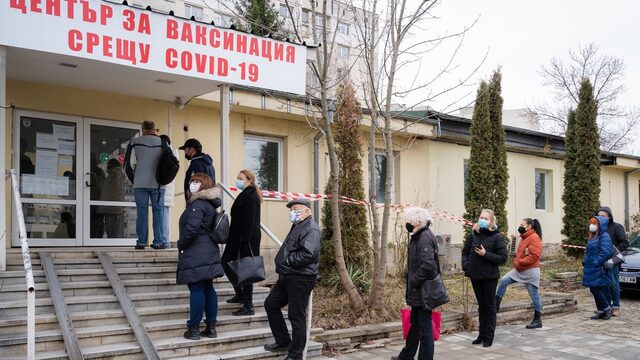How many years of "lost life" did Bulgarians incur as a result of the Covid-19 pandemic? A report by several national statistics and epidemiological institutions, obtained and published by Dnevnik.bg, sets the toll to be "at least 860,000 years of potential life" for the March 2020 - May 2022 active pandemic phase. The calculation was made by totting up the expected lost life span of those who died from the disease. This, rather grimly, puts Bulgaria in top spot in the world for this indicator.
The report has Bulgaria ranked second in the world after Peru in Covid-19 mortality per 1 million population, and first for excess mortality. However, it's hard to establish whether this is exclusively due to low vaccination levels, or hospitals' poor response to the epidemic, or a combination of various factors.
The analysis relies on data that includes all officially registered cases (1,126,945), and the number of hospitalized and deceased in Bulgaria up to the end of March 2022. According to it, the average age of those infected was 48 years, with people of virtually all ages affected (from babies to a 109-y.o. person). The 36,192 people who died during this period had an average age of 71.5 years. Experts found that mortality among the vaccinated was 20% lower than those who had not been jabbed. It is reported that in the first pandemic year, one in five were treated in hospital, but there was no shortage of beds in intensive care units. This contradicts earlier reports claiming that, at the height of the pandemic, a shortage of intensive care beds and medical specialists in hospitals caused extra fatalities.
Last in Europe - by a magnitude
The ratio of registered Covid-19 deaths per capita is about 5 500 deaths per million population. For the same period, the excess death rate (the number of deaths in excess of the number expected for the relevant time period) is about 69,000 people (slightly more than 1% of the country's population), or 10,400 per million population, the report claims. This means that around half of the excess deaths in the period formally resulted from the virus.
The excess mortality rate is considered the most accurate indicator of pandemic casualties, both direct and indirect. This is because, in addition to the officially recorded pandemic losses, it indirectly measures deaths due to undiagnosed Covid-19, as well as deaths due to untimely treatment of other diseases because the health system was overburdened.
To calculate the years of potential life lost per 100,000 population, a metric is used to gauge the life expectancy for each deceased person, giving more weight to those who died young: "For example, a man who dies at the age of 60 in Bulgaria corresponds to 17 years of lost life, while for a man who dies in France the years of life lost are 23. These figures correspond to the life expectancy for that age and sex in the country concerned," the authors point out.
The final picture is bleak: 860,000 years of accumulated life expectancy were forfeited by Bulgarians, with an average of 12.6 years of life lost for every person who died as a result of the pandemic. "Bulgaria's figure of 11,500 years of life lost per 100,000 population is many times higher than those for countries such as France, Portugal, the Netherlands, Austria, Belgium, Slovenia, Italy and Spain, where years of life lost per 100,000 population range between 1,700 and 3,000," the report claims.
According to the report, Bulgaria had 43 doctors per 10,000 population in 2020, more than the EU average of 35.1 per 10,000. However, it is reported that staffing in the country's public health structures remains in a dire state. In 2020, disparities in the supply of medical specialists by districts and regions are identified, giving rise to inequalities in access to medical care.

Highest death rate since 1945
The overall mortality rate for the entire observation period was 3.21%, the data show. While the majority of those infected with Covid-19 (53.8%) were women, most of the deceased were men (55.2%). The report states that there is no definitive evidence-based explanation as to why infection is associated with a higher risk of death for men.
The report states that in 2021 the mortality rate is the highest ever recorded in Bulgaria since 1945. It cites data from the National Statistical Institute (NSI), which shows that the number of deaths in the country in 2021 was 148,995 and the overall mortality rate was 21.7%. Compared to the previous year, they increased by 24,260, or by 19.4%. According to the NSI annual data on deaths by cause in 2020, the total number of deaths is 124,735, of which 8,554 (7%) are from Covid-19. Compared to 2019, the absolute number of deaths increased by 16,652.
No less telling an indicator of a nation's mortality-related health is life expectancy. In Bulgaria, it has shown an upward trend over the last twenty years, but the pandemic year 2020, for the first time, saw a decrease in this indicator. According to Eurostat, in 2020 this indicator in Bulgaria is 6.8 years lower than the average for EU countries and the lowest compared to all EU member states.
The large difference between the registered COVID-19 mortality and the excess mortality in the country is mainly explained by two closely related circumstances. First, about 95% of all registered Covid-19 deaths are of people who died in hospitals. Thus, the majority of people who died from Covid-19 outside hospitals are excluded. The second is the small number of tests done, which means that many who died from the virus were never tested for it and therefore do not enter the official statistics. By August 2021, there were 530 tests per 1,000 population in Bulgaria, which ranks last in the EU, with testing improving from autumn 2021, which also leads to some decline in the ratio between excess and recorded COVID-19 mortality.
"The lack of data in the unified information system on the therapy administered to hospitalized patients, including those who have died, does not allow the impact of the therapeutic approach on the outcome of the disease to be reported," experts concluded.
How many years of "lost life" did Bulgarians incur as a result of the Covid-19 pandemic? A report by several national statistics and epidemiological institutions, obtained and published by Dnevnik.bg, sets the toll to be "at least 860,000 years of potential life" for the March 2020 - May 2022 active pandemic phase. The calculation was made by totting up the expected lost life span of those who died from the disease. This, rather grimly, puts Bulgaria in top spot in the world for this indicator.
The report has Bulgaria ranked second in the world after Peru in Covid-19 mortality per 1 million population, and first for excess mortality. However, it's hard to establish whether this is exclusively due to low vaccination levels, or hospitals' poor response to the epidemic, or a combination of various factors.












